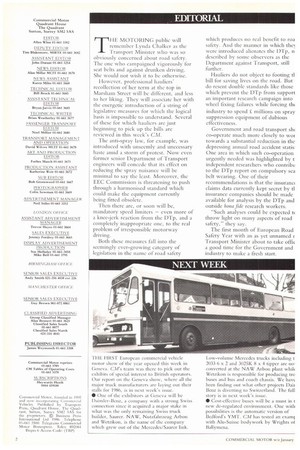EDITORIAL
Page 2

If you've noticed an error in this article please click here to report it so we can fix it.
THE MOTORING public will remember Lynda Chalker as the Transport Minister who was so obviously concerned about road safety. The one who campaigned vigorously for seat belts and against drunken driving. She would not wish it to be otherwise.
llowever, professional hauliers' recollection of her term at the top in Marsham Street will be different, and less to her liking. They will associate her with the energetic introduction of a string of legislative measures for which the logical basis is impossible to understand. Several of these for which hauliers are just beginning to pick up the bills are reviewed in this week's CM.
The anti-spray law, for example, was introduced with unseemly and unecessary haste amid a storm of protest. Now even former senior Department of Transport engineers will concede that its effect on reducing the spray nuisance will be minimal to say the least. Moreover, the EEC Commission is threatening to push through a harmonised standard which could make the equipment currently being fitted obsolete.
Then there arc, or soon will be, mandatory speed limiters — even more of a knee-jerk reaction from the DTp, and a completely inappropriate one, to the real problem of irresponsible motorway driving.
Both these measures fall into the seemingly ever-growing category of legislation in the name of road safety which produces no real benefit to roa safety. And the manner in which the were introduced alienates the DTp, n described by some observers as the Department against Transport, still further.
Hauliers do not object to footing ti bill for saving lives on the road. But do resent double standards like those which prevent the DTp from support an important research campaign into wheel fixing failures while forcing thc industry to spend millions on spray suppression equipment of dubious effectiveness.
Government and road transport shc co-operate much more closely to wot towards a substantial reduction in the depressing annual road accident statisi One area in which such co-operation urgently needed was highlighted by t. independent researchers who contribu to the DTp report on compulsory sea belt wearing. One of their recommendations is that the insurana claims data currently kept secret by ti insurance companies should be made available for analysis by the DTp and outside hona fide research workers.
"Such analyses could be expected tc throw light on many aspects of road safety," they say.
The first month of European Road Safety Year with an as yet unnamed r Transport Minister about to take offic a good time for the Government and industry to make a fresh start.






















































